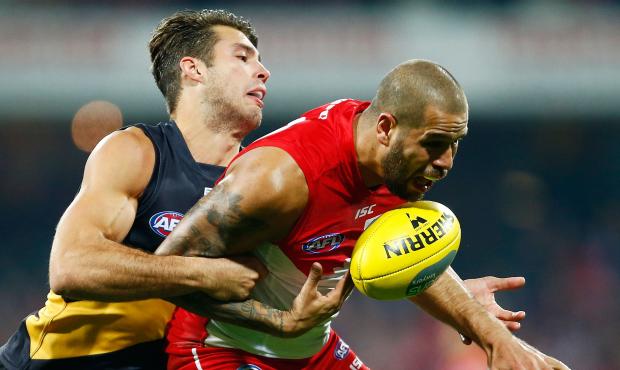IN ROUND 13, four of the six teams coming off the bye faced opponents who did not have the 'benefit' of a week's rest. All four lost.
So, is it an advantage for the Swans to face Port Adelaide on Thursday night with six fewer days break than their opponents?
Logic would suggest not, but that logic hasn't held this season.
In 2015, teams with six-day breaks have won 56 per cent of games against opponents coming off seven-day breaks, and 80 per cent of games against opponents with eight-day breaks.
The bigger worry for the Swans is their inability to play four quarters of football.
In two of their first four games, they scored 89 per cent of their goals in the second half, to run down Essendon – just – and lose to Fremantle.
They were excused for a slow start to the season (and slow starts to those games) as they recorded wins against Port Adelaide and Greater Western Sydney and sat in the top four after four weeks.
Their next four weeks were solid, recording three wins before a trend of fading out emerged about a month ago.
In the past three games, 68 per cent of the Swans' goals have come in the first half.
The premiership-contending Swans have not won a third quarter for three games, and won just half their 'premiership quarters' this season.
The four teams around them on the ladder – Fremantle, West Coast, Hawthorn and Collingwood – have won that quarter at least 75 per cent of the time in the first 12 rounds and it has been the quarter they have won most in 2015.
It's the time of the game when the Dockers (nine third quarters won), Eagles (10), Hawks (11) and Magpies (nine) put the foot on the accelerator.
The Swans fell in a hole after half time on Friday night, conceding 11 of the final 14 goals against Richmond and seven goals in the third quarter.
The Tigers had not won a third quarter since round six, when they went in at half-time 32 points behind the Swans.
So it was an indictment on the Swans that the Tigers went to the three-quarter time huddle in front.
The Swans basically stopped working after half-time, winning 85 handball receives and 49 uncontested marks in the first half, and just 54 handball receives and 32 uncontested marks in the second half.
Franklin, Tippett and Lewis Jetta had just one disposal between them in the third quarter.
Lance Franklin battled after half-time against Richmond. Picture: AFL Media
Longmire saw the issue immediately after the game and bemoaned his team's inability to respond to the challenge.
"Teams get momentum. It happens in football every game all the time," Longmire said.
"The way the game is played you have to make sure that when you wrestle the momentum back you then surge again."
The Swans are in danger of losing momentum in their season if they can't turn around the situation against Port Adelaide on Thursday.
The six-day break should hold no fears.
Since 2000, a team having a six-day break has a 48 per cent winning record when opposed to a team with a seven-day break.
In that same time period, a team having a six-day break has a 43 per cent winning record against opponents having an eight-day break.
Let's face it, any pre-planning Port Adelaide coach Ken Hinkley did would have gone in the garbage once 'Buddy' Franklin and Kurt Tippett were reported.
When it was revealed on Monday afternoon the forward duo would miss, Hinkley had about 75 hours left to change tack; a task he would have undertaken with pleasure.
And if the Swans lose, could you really put the result down to the break, or would you take into account the loss of two key forwards?
That's not a serious question.
What is seriously under question is whether the Swans are capable of coming out after half-time and matching it with the best without their two key forwards.
If they win against the odds on Thursday night that question will be answered.



